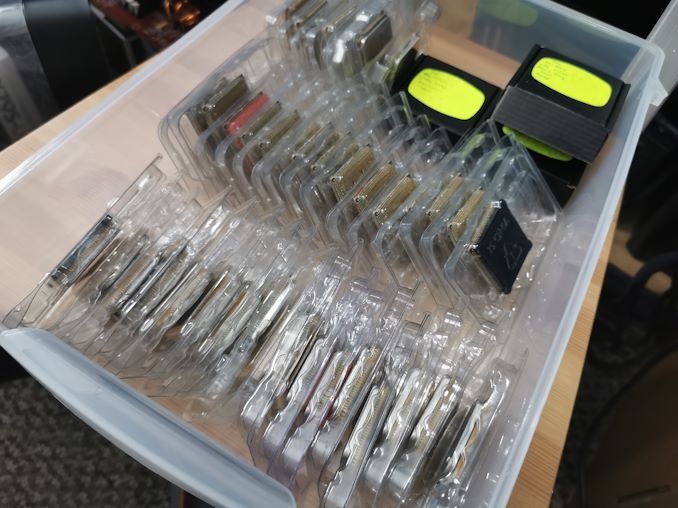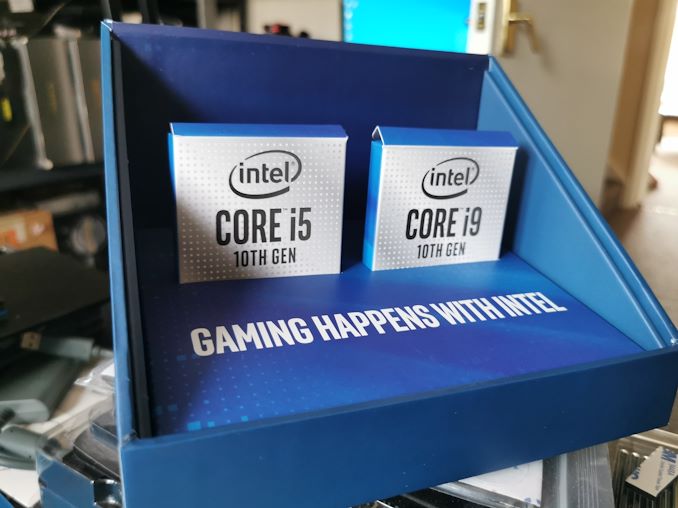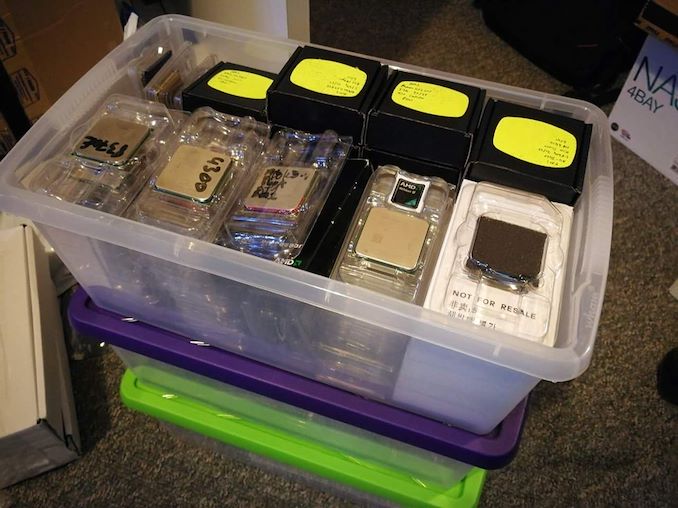Launching the #CPUOverload Project: Testing Every x86 Desktop Processor since 2010
by Dr. Ian Cutress on July 20, 2020 1:30 PM EST#CPUOverload: What is Realistic?
Truth be told, the concept of a project to benchmark almost 700-900 processors has been rattling around in my head for a few years. I actually wrote the first segment of this article way back in 2016. However, over the course of 2016 and 2017, building new testing suites has taken longer, priorities changed, and the project didn’t so much as get shelved as somewhat pushed down the order on a semi-permanent basis until there was an ideal opening. Those of you who have followed the site may have noticed my responsibilities increase over time, darting 200k miles a year around the world. It can be difficult to keep a large project buoyant without constant attention.
Between 2016 and today, we’ve still be churning though the tests on the hardware, and updating our benchmark database with as many chips as we can find, even if it wasn’t under a governed project. The most recent version of our CPU2019 Bench has 272 CPUs with data recorded on up to 246 benchmark data points for each, just to showcase perhaps what one person can do in a given year. However, the focus of Bench being a specific project wasn’t necessarily a primary target of the site. With the launch of our Bench2020 suite, with a wider variety of tests and analysis, we’re going to put this into action. That’s not to say I have more time than normal (I might have to propose what we can do about getting an intern), but with the recent pandemic keeping me on the ground, it does give a chance to take stock about what users are really after.
With #CPUOverload, the goal is to do more than before, and highlight the testing we do. This is why I’ve spent the best part of 25-30 pages talking about benchmark sustainability, usefulness, automation, and why every benchmark is relevant to some of our user base. Over the last decade, as a hardware tester providing results online for free, one obvious change in the requests from our readers has been to include specific benchmarks that target them, rather than generic ones related to their field. That’s part of what this project is, combined with testing at scale.
Users also want to find their exact CPU, and compare it to an exact CPU potential upgrade – a different model, at least in today’s naming conventions, might have different features. So getting exactly what you want to compare is always going to be better – being able to see how your Intel Core i5-2380P in that Dell OEM system you have had for 7 years compares to a newer Ryzen 7 2700E or Xeon E-2274G is all part of what makes this project exciting. That essence of scale, and trying to test as many different CPU variants as possible, is going to be a vital part of this project.
Obviously the best place to start with a project like this is two-fold: popular processors and modern processors. These get the most attention, and so covering the key parts from Coffee Lake, Kaby Lake, Ryzen and HEDT are going to be high on our list to start. The hardware that we’re also testing for review also gets a priority, so that’s why you might start seeing some Zhaoxin or Xeon/EPYC data enter Bench very soon. One funny element is that if you were to start listing what might be ‘high importance processors’, it very easily come back with a list of between 25-100 SKUs, with various i9/i7/i5/i3 and R7/R5/R3/APU as well as Intel/AMD HEDT and halo parts in there – that’s already 10 segments! Some users might want us to focus on the cheap Xeon parts coming out of China too. Obviously whatever our users want to see be tested, we want to hear about it.
As part of this project, we are also expecting to look at some retrospective performance. Future articles might include ‘how well does Ivy Bridge i5 perform today’, or given AMD and Intel’s tendency to compare five year products to each other, we are looking to do that too, in both short and longer form articles.
When I first approached AMD and Intel’s consumer processor divisions about this project, wondering how much interest there would be for it, both came back to me with positive responses. They filled in a few of my hardware gaps, but cautioned that even as internal PR teams, they won’t have access to most chips, especially the older ones. This means that as we process through the hardware, we might start reaching out to other partners in order to fill in the gaps.
Is testing 900 CPUs ultimately realistic? Based on the hardware I have today, if I had access to Narnia, I could provide data for about 350 of the CPUs. In reality, with our new suite, each CPU takes 20-30 hours to test on the CPU benchmarks, and another 10 hours for the gaming tests. Going for 50-100 CPUs/month might be a tough ask, but let’s see how we get on. We have these dozen or so CPUs in the graphs here to start.
Of course, comments are always welcome. If there’s a CPU, old or new, you want to see tested, then please drop a comment below. It will help how I arrange which test beds get priority.













110 Comments
View All Comments
PeachNCream - Tuesday, July 21, 2020 - link
You don't get what it means to perform a controlled test do you?Aspernari - Wednesday, July 22, 2020 - link
It's important to note that the environment is not actually well-controlled.https://twitter.com/IanCutress/status/128480609693...
We don't know temperature for the operating conditions for these tests, which matters more and more for boost behavior for CPUs and GPUs. He says 36c when he got into the office, we'll never know what the temperature peaked at, nor how often similar conditions were reached.
A standard platform is a good choice, but a controlled environment is also important. Unfortunately, the results aren't as reliable as they otherwise might have been.
PeterCollier - Wednesday, July 22, 2020 - link
And that's why this entire test is a complete waste of time. Something like Geekbench or especially Userbench is much, much better because it gives you a range of scores. Instead of trying to create false precision by saying that a AMD 4700U scored, say, a "979" on a benchmark, Userbench will say that all the 4700U's tested scored from 899 to 1008, and break it down into percentiles. This way, you have a range of expected performance in mind instead of being fixated on that "979" number, which could have been obtained in an unrealistic scenario.Rudde - Saturday, July 25, 2020 - link
Isn't userbench a synthetic together with geekbench? What exactly are they testing? Instead of knowing which of Intel i7 10700k and AMD ryzen 7 3800X is better at rendering, video encoding, number crunching or whatever your use case is, you'll get a distribution based on a largely unknown test. The Intel and AMD processors might end up being within error margins of each other in your use case, but that in itself tells something too. All benchmarks are inherently bad; there is not a single benchmark that captures every use case while not being affected by its environment (ram speeds, temperatures, etc). I prefer tests that I understand, over tests that I do not understand.bananaforscale - Wednesday, July 22, 2020 - link
One could ask what the point of Userbenchmark is in these days of quadcores being basically entry level while the benchmark has DECREASED its multicore weighting.A5 - Monday, July 20, 2020 - link
For my own personal test, getting an i7-4770K in the list would be a big help.Once you have a compile test, a Xeon E5-1680v3 would be nice to see so that I can sell my corp on newer workstations...
Shmee - Wednesday, July 22, 2020 - link
Those are great Haswell EP CPUs, and they OC too! I have an E5-1660v3 in my X99 rig.Mockingtruth - Monday, July 20, 2020 - link
I have a 3570k and a E8600 spare with respective motherboards and ram if useful?CampGareth - Monday, July 20, 2020 - link
Personally I'd like to see a Xeon E5-2670 v1 benchmarked. I'm still running a pair of them as my workstation but these days AMD can beat the performance on a single socket and halve the power consumption.Samus - Tuesday, July 21, 2020 - link
Do you run them in an HP Z620? I ran the same system with the same CPU’s for years at one of my clients. What a beast.